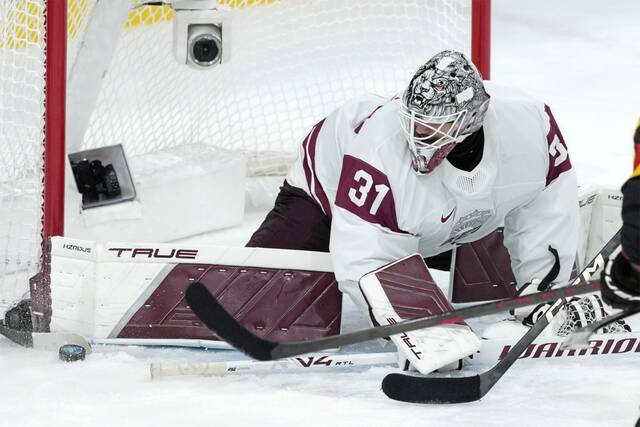Bryan Rust sat there, waiting.
As the stampede of reporters, cameramen and interns poured into the home dressing room at PPG Paints Arena to interview members of the Pittsburgh Penguins after a 3-2 overtime win against the Montreal Canadiens on Jan. 27, Rust was calmly stationed at his stall, largely ignored by the initial rush.
Forwards Jake Guentzel (who scored the tying goal), Lars Eller (who appeared in his 1,000th career game) and defenseman Marcus Pettersson (who scored the winning goal) absorbed the opening fury of questions. Rust remained seated and eventually drew the attention of other media.
The same thing happened the night prior after a 3-2 home shootout loss to the Florida Panthers. While other teammates vacated the dressing room quickly, Rust stayed put and answered inane queries about the power play or the team’s mindset after a loss.
That’s typical fare for Rust. He’s not the face of the franchise. Sidney Crosby carries that weight. But Rust is certainly a spokesperson for the team in good times and bad.
He always speaks with authority on all matters on the ice as he makes an effort to provide interviewers with thoughtful answers.
Even if those answers aren’t always delivered with ease.
Rust is a stutterer.
And he makes absolutely no effort to hide it.
Even with a hushed repeating of an opening syllable or a more audible jumble of similar vocabulary, Rust speaks with all the brash confidence of a public address announcer at a monster truck rally.
That openness with his speech disorder led to him working with the National Association of Young People Who Stutter (the group’s name is often presented simply as “Friends.”)
Per Friends’ website, the group is “dedicated to providing support and education to young people who stutter, their families, and professionals.”
After seemingly every home game — with occasional exceptions because of injuries — Rust will hold meetings with children who deal with a stutter (and a parent) in a hallway adjacent to the Penguins’ dressing room.
In addition to supplying tickets to the game, Rust poses for photos, autographs merchandise and above all else, just talks to the kids about their common trait.
“Obviously, something that’s close to my heart,” Rust said Jan. 25 at the team’s facility in Cranberry. “Something that’s really important to me and my family. Something that might get overlooked. … It’s something that I’ve gone through, and I’ve tried my best to go through that adversity and tried to get better. It’s something that for me was important because it gets overlooked.”
Rust’s self-confidence with his stutter during a 2017 television interview wasn’t overlooked by Allison Ladavat, program director with Friends who also works as a clinical instructor with Duquesne University’s stuttering clinic.
Ladavat, who is a stutterer as well, reached out to the Penguins Foundation in 2022 and got Rust involved with Friends.
“I have been honestly blown away by how genuine he is,” said Ladavat, who is also a speech pathologist. “How much he cares. And I hear that from every family who attends the games. It’s 41 home games, so it’s 41 kids who stutter and one of their parents. They often send us emails afterward just telling us how incredible the whole experience was and how happy he is to talk to the kids, how he really listens to them. They ask him questions; he answers. He signs everything. It’s really individualized, too. He really takes his time to talk to each child.
“Even after games that are probably hard, tough losses, he comes out just as eager to chat to these kids. Just how genuine he is. And how he really seems to be passionate and honestly cares … it’s just a huge impact on all the kids and their families.”
While Rust carries a healthy amount of humility as an NHLer — often reminding reporters he is prone to scoring slumps — he understands he is a celebrity. And with that, his openness with his stutter allows him to be a role model to others with speech impediments.
Rust didn’t have to look far for a role model with this characteristic.
His brother, former Wilkes-Barre/Scranton Penguins forward Matt Rust, also has a stutter.
“My older brother went through it, and he was my ‘celebrity,’ per se. He was my person to look up to,” Rust said. “Anytime a kid has somebody that’s in the spotlight and going through the same thing, it makes things a little bit more normal for them.
“When kids are going through things, they can feel like a little bit of an outcast. That brings things into perspective. There’s other people going through this. There’s people that have persevered through it and done great things. I want to be that beacon of hope for kids.”
The value of having a high-profile voice directly address those with speech disorders is immeasurable.
“As a kid who grew up in Pittsburgh and stuttered, I didn’t have anyone to look up to and didn’t have any friends here who stuttered,” Ladavat said. “I didn’t meet anybody who stuttered until I was about 20. So having peer support to begin with is huge. And having a celebrity, especially here having an athlete, it really helps all of these kids that they can do anything they want to and their speech doesn’t have to hold them back at all.
“Having the visibility and hearing him talk and hearing him stutter really, really helps these kids so they don’t feel so isolated and alone.”
As with just about any subject, the words Rust shares with fellow stutterers are worth listening to.
“Don’t shy away from conversation,” Rust said. “Don’t shy away from speaking in public. That’s something that I did for a long time. … Try to read in class, be the kid that raises their hand. Don’t shy away from it.
“If you stumble, take a deep breath, keep doing it.”











